UNIT 6 THE MEDIA高考真题练(含解析)
文档属性
| 名称 | UNIT 6 THE MEDIA高考真题练(含解析) |
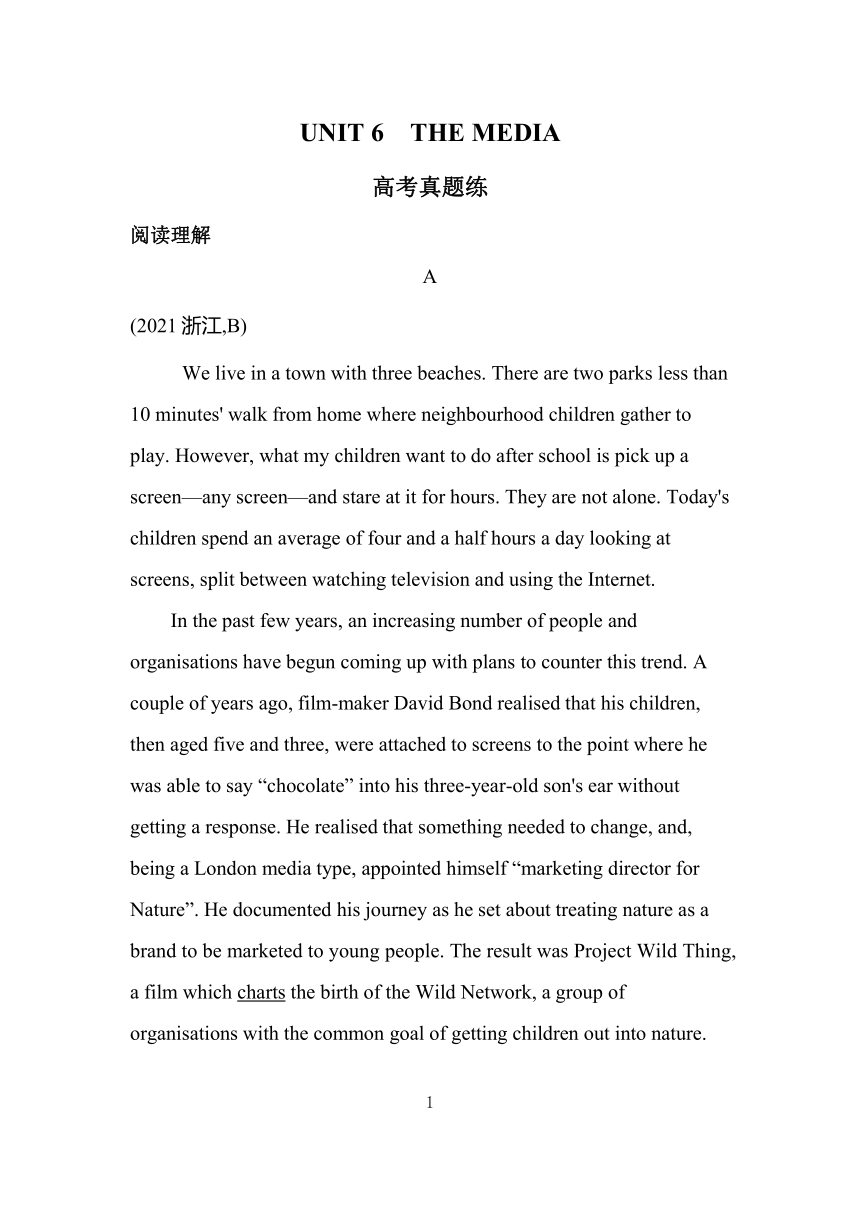
|
|
| 格式 | docx | ||
| 文件大小 | 30.8KB | ||
| 资源类型 | 试卷 | ||
| 版本资源 | 北师大版(2019) | ||
| 科目 | 英语 | ||
| 更新时间 | 2025-12-04 17:25:29 | ||
图片预览

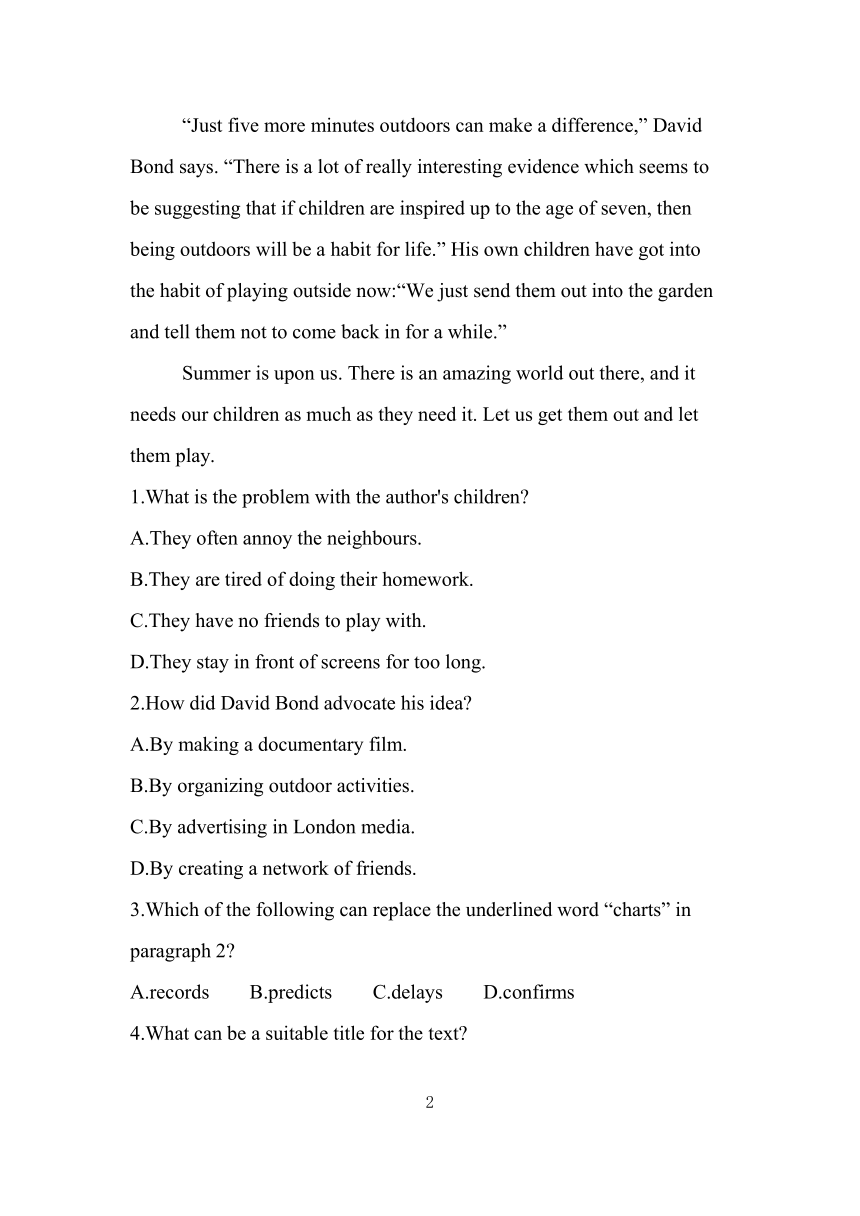
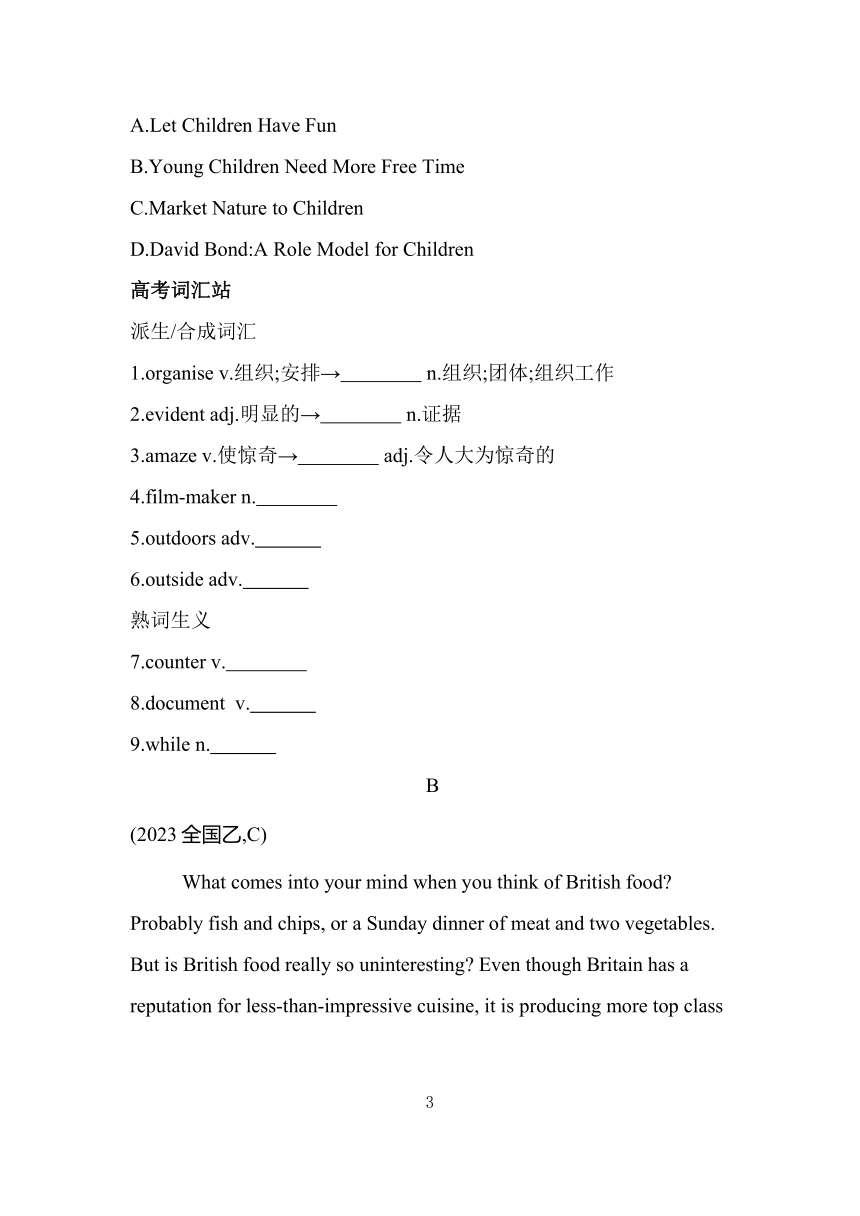
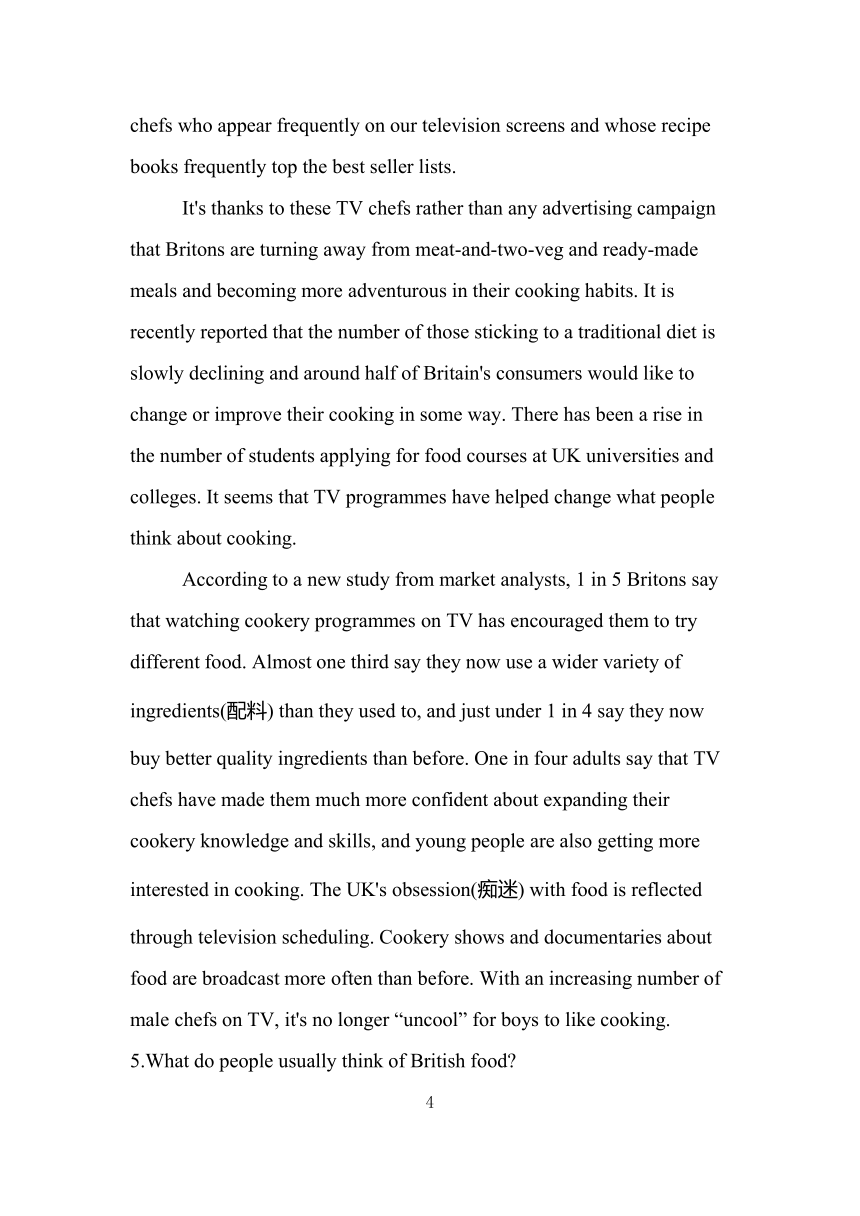
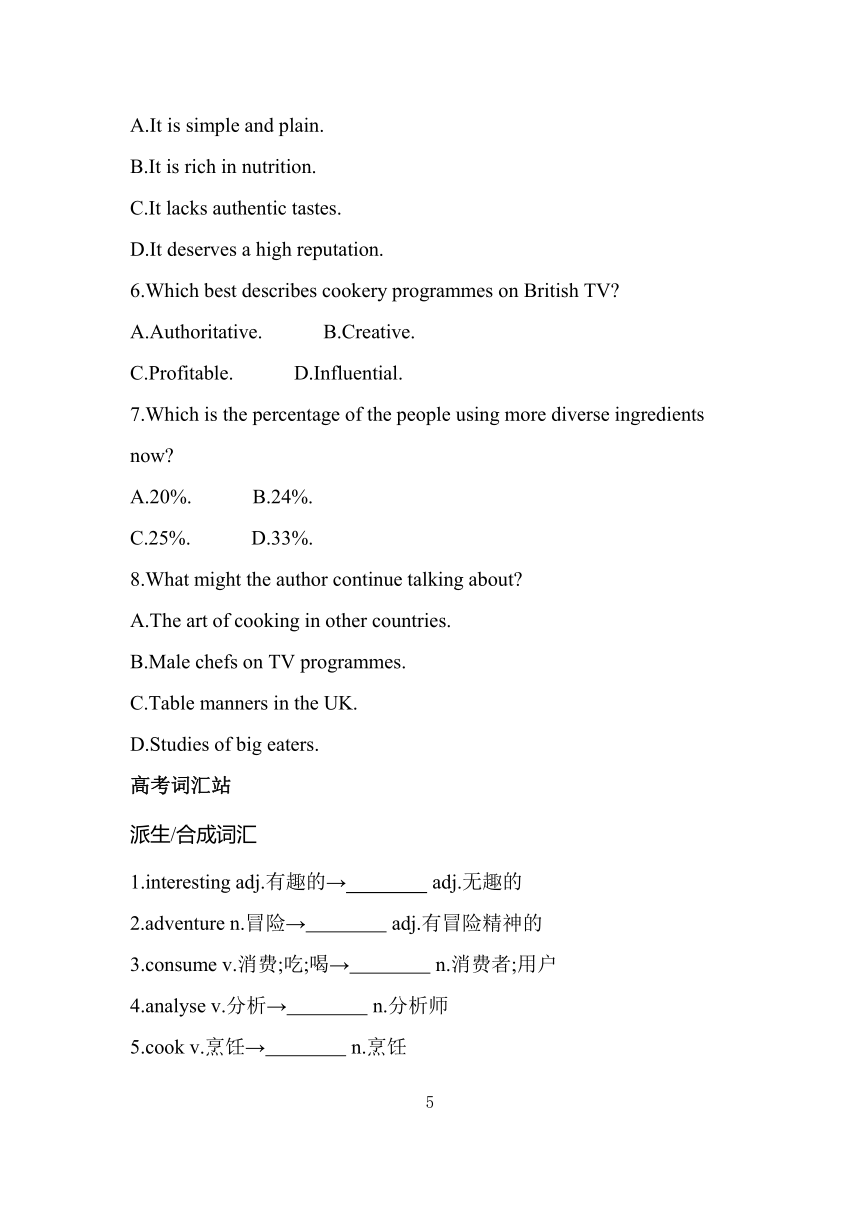
文档简介
UNIT 6 THE MEDIA
高考真题练
阅读理解
A
(2021浙江,B)
We live in a town with three beaches. There are two parks less than 10 minutes' walk from home where neighbourhood children gather to play. However, what my children want to do after school is pick up a screen—any screen—and stare at it for hours. They are not alone. Today's children spend an average of four and a half hours a day looking at screens, split between watching television and using the Internet.
In the past few years, an increasing number of people and organisations have begun coming up with plans to counter this trend. A couple of years ago, film-maker David Bond realised that his children, then aged five and three, were attached to screens to the point where he was able to say “chocolate” into his three-year-old son's ear without getting a response. He realised that something needed to change, and, being a London media type, appointed himself “marketing director for Nature”. He documented his journey as he set about treating nature as a brand to be marketed to young people. The result was Project Wild Thing, a film which charts the birth of the Wild Network, a group of organisations with the common goal of getting children out into nature.
“Just five more minutes outdoors can make a difference,” David Bond says. “There is a lot of really interesting evidence which seems to be suggesting that if children are inspired up to the age of seven, then being outdoors will be a habit for life.” His own children have got into the habit of playing outside now:“We just send them out into the garden and tell them not to come back in for a while.”
Summer is upon us. There is an amazing world out there, and it needs our children as much as they need it. Let us get them out and let them play.
1.What is the problem with the author's children
A.They often annoy the neighbours.
B.They are tired of doing their homework.
C.They have no friends to play with.
D.They stay in front of screens for too long.
2.How did David Bond advocate his idea
A.By making a documentary film.
B.By organizing outdoor activities.
C.By advertising in London media.
D.By creating a network of friends.
3.Which of the following can replace the underlined word “charts” in paragraph 2
A.records B.predicts C.delays D.confirms
4.What can be a suitable title for the text
A.Let Children Have Fun
B.Young Children Need More Free Time
C.Market Nature to Children
D.David Bond:A Role Model for Children
高考词汇站
派生/合成词汇
1.organise v.组织;安排→ n.组织;团体;组织工作
2.evident adj.明显的→ n.证据
3.amaze v.使惊奇→ adj.令人大为惊奇的
4.film-maker n.
5.outdoors adv.
6.outside adv.
熟词生义
7.counter v.
8.document v.
9.while n.
B
(2023全国乙,C)
What comes into your mind when you think of British food Probably fish and chips, or a Sunday dinner of meat and two vegetables. But is British food really so uninteresting Even though Britain has a reputation for less-than-impressive cuisine, it is producing more top class chefs who appear frequently on our television screens and whose recipe books frequently top the best seller lists.
It's thanks to these TV chefs rather than any advertising campaign that Britons are turning away from meat-and-two-veg and ready-made meals and becoming more adventurous in their cooking habits. It is recently reported that the number of those sticking to a traditional diet is slowly declining and around half of Britain's consumers would like to change or improve their cooking in some way. There has been a rise in the number of students applying for food courses at UK universities and colleges. It seems that TV programmes have helped change what people think about cooking.
According to a new study from market analysts, 1 in 5 Britons say that watching cookery programmes on TV has encouraged them to try different food. Almost one third say they now use a wider variety of ingredients(配料) than they used to, and just under 1 in 4 say they now buy better quality ingredients than before. One in four adults say that TV chefs have made them much more confident about expanding their cookery knowledge and skills, and young people are also getting more interested in cooking. The UK's obsession(痴迷) with food is reflected through television scheduling. Cookery shows and documentaries about food are broadcast more often than before. With an increasing number of male chefs on TV, it's no longer “uncool” for boys to like cooking.
5.What do people usually think of British food
A.It is simple and plain.
B.It is rich in nutrition.
C.It lacks authentic tastes.
D.It deserves a high reputation.
6.Which best describes cookery programmes on British TV
A.Authoritative. B.Creative.
C.Profitable. D.Influential.
7.Which is the percentage of the people using more diverse ingredients now
A.20%. B.24%.
C.25%. D.33%.
8.What might the author continue talking about
A.The art of cooking in other countries.
B.Male chefs on TV programmes.
C.Table manners in the UK.
D.Studies of big eaters.
高考词汇站
派生/合成词汇
1.interesting adj.有趣的→ adj.无趣的
2.adventure n.冒险→ adj.有冒险精神的
3.consume v.消费;吃;喝→ n.消费者;用户
4.analyse v.分析→ n.分析师
5.cook v.烹饪→ n.烹饪
6.vary v.变化;改变→varied adj.各种各样的;变化的→ n.多种式样;变化;变体
7.less-than-impressive adj.
8.meat-and-two-veg adj.
9.ready-made adj.
答案与分层梯度式解析
UNIT 6 THE MEDIA
高考真题练
A
◎语篇解读 本文为议论文,作者开始讲述了自家孩子迷恋电子屏幕,以此引出电影导演通过拍摄影片向孩子们“推销”大自然,引导他们养成户外活动的习惯。
1.D 细节理解题。本题题干意为:作者的孩子们有什么问题 A.他们经常打扰邻居;B.他们疲于做作业;C.他们没有朋友和他们玩;D.他们在屏幕前的时间太长了。根据第一段第三句“However, what my children want to do after school is pick up a screen—any screen—and stare at it for hours.”可知,孩子们放学后看电子屏幕的时间太长。
2.A 细节理解题。本题题干意为:David Bond是如何倡导自己的理念的 A.通过制作一部纪录片;B.通过组织户外活动;C.通过在伦敦媒体上做广告;D.通过建立一个朋友网。根据第二段最后三句“He realised that something needed to change...He documented his journey...The result was Project Wild Thing, a film which...”可知,David Bond 是通过拍摄影片来倡导自己的理念的。
3.A 词义猜测题。本题题干意为:下面哪项可以代替第二段中的画线单词“charts” A.记录;B.预测;C.推迟;D.确认。chart以名词形式出现的频率较高,意为“图表”,图表的作用是“记录”信息数据,因此chart作动词时意为“记录”。在本文中,charts在定语从句中作谓语动词,其主语which指代film,定语从句正是在描述此部电影记录的内容,因此charts相当于records。
4.C 主旨大意题。本题题干意为:文章的合适的标题是什么 这篇文章开始讲述了孩子看屏幕时间过长,以此引出David Bond拍摄影片来向孩子们“推销”大自然,引导他们多接触自然,不再迷恋电子设备。文章内有高频词“nature”“outdoors”“children”“screen”等,所以C项合适。
【高考词汇站】 1.organisation 2.evidence 3.amazing
4.电影制作人 5.在户外 6.在外边 7.抵制 8.记录,记载 9.一段时间,一会儿
长难句
原句 A couple of years ago, film-maker David Bond realised that his children, then aged five and three, were attached to screens to the point where he was able to say “chocolate” into his three-year-old son's ear without getting a response.
分析 本句是一个主从复合句。主干是“film-maker David Bond realised”,that引导宾语从句,作动词realised的宾语,在宾语从句中,又含有一个where引导的定语从句,修饰先行词point。
译文 几年前,电影制作人大卫·邦德意识到,他的孩子,当时是5岁和3岁,都非常喜欢屏幕,到了他可以对着3岁儿子的耳朵说“巧克力”而得不到回答的地步。
B
◎语篇解读 本文是一篇说明文,主题语境是人与社会,主题语境内容为饮食与文化。文章介绍了英国的电视烹饪节目对英国人的饮食习惯产生了巨大的影响,激发了人们对烹饪的兴趣。
5.A 细节理解题。本题题干意为:人们通常如何看待英国食物 A.它简单且普通;B.它富含营养;C.它缺乏正宗的口味;D.它享有盛誉。根据第一段中的“But is British food really so uninteresting Even though Britain has a reputation for less-than-impressive cuisine”可知,人们通常认为英国食物不太让人感兴趣,给人的印象不那么深刻,即简单且普通。故选A项。
6.D 推理判断题。本题题干意为:哪一项最好地描述英国电视上的烹饪节目 A.有权威的;B.有创意的;C.盈利的;D.有影响力的。根据第二段中的“It's thanks to these TV chefs rather than any advertising campaign that Britons are turning away from meat-and-two-veg and ready-made meals and becoming more adventurous in their cooking habits.”及“It seems that TV programmes have helped change what people think about cooking.”可知,电视烹饪节目上的厨师们让英国人对传统的“一荤两素”和现成餐食失去兴趣,并开始在烹饪习惯上变得更加敢于大胆创新,电视节目似乎帮助改变了人们对烹饪的看法。由此可推知,英国电视上的烹饪节目很有影响力。故选D项。
7.D 细节理解题。本题题干意为:现在使用更多不同的配料的人的百分比是多少 根据最后一段中的“Almost one third say they now use a wider variety of ingredients than they used to”可知,近三分之一的人表示,他们现在使用的配料比过去种类更多。故选D项。
8.B 推理判断题。本题题干意为:作者可能继续讨论什么 A.其他国家的烹饪艺术;B.电视节目中的男性厨师;C.英国的餐桌礼仪;D.对大胃王的研究。根据文章尾句“With an increasing number of male chefs on TV, it's no longer ‘uncool’ for boys to like cooking.”可知,随着越来越多的男厨师出现在电视上,男孩喜欢烹饪已经不再是“不酷”的事了。由此推知,接下来作者可能会接着讨论电视节目上的男厨师们。故选B项。
【高考词汇站】 1.uninteresting 2.adventurous
3.consumer 4.analyst 5.cookery 6.variety 7.不那么令人印象深刻 8.一荤两素的 9.现成的
7
高考真题练
阅读理解
A
(2021浙江,B)
We live in a town with three beaches. There are two parks less than 10 minutes' walk from home where neighbourhood children gather to play. However, what my children want to do after school is pick up a screen—any screen—and stare at it for hours. They are not alone. Today's children spend an average of four and a half hours a day looking at screens, split between watching television and using the Internet.
In the past few years, an increasing number of people and organisations have begun coming up with plans to counter this trend. A couple of years ago, film-maker David Bond realised that his children, then aged five and three, were attached to screens to the point where he was able to say “chocolate” into his three-year-old son's ear without getting a response. He realised that something needed to change, and, being a London media type, appointed himself “marketing director for Nature”. He documented his journey as he set about treating nature as a brand to be marketed to young people. The result was Project Wild Thing, a film which charts the birth of the Wild Network, a group of organisations with the common goal of getting children out into nature.
“Just five more minutes outdoors can make a difference,” David Bond says. “There is a lot of really interesting evidence which seems to be suggesting that if children are inspired up to the age of seven, then being outdoors will be a habit for life.” His own children have got into the habit of playing outside now:“We just send them out into the garden and tell them not to come back in for a while.”
Summer is upon us. There is an amazing world out there, and it needs our children as much as they need it. Let us get them out and let them play.
1.What is the problem with the author's children
A.They often annoy the neighbours.
B.They are tired of doing their homework.
C.They have no friends to play with.
D.They stay in front of screens for too long.
2.How did David Bond advocate his idea
A.By making a documentary film.
B.By organizing outdoor activities.
C.By advertising in London media.
D.By creating a network of friends.
3.Which of the following can replace the underlined word “charts” in paragraph 2
A.records B.predicts C.delays D.confirms
4.What can be a suitable title for the text
A.Let Children Have Fun
B.Young Children Need More Free Time
C.Market Nature to Children
D.David Bond:A Role Model for Children
高考词汇站
派生/合成词汇
1.organise v.组织;安排→ n.组织;团体;组织工作
2.evident adj.明显的→ n.证据
3.amaze v.使惊奇→ adj.令人大为惊奇的
4.film-maker n.
5.outdoors adv.
6.outside adv.
熟词生义
7.counter v.
8.document v.
9.while n.
B
(2023全国乙,C)
What comes into your mind when you think of British food Probably fish and chips, or a Sunday dinner of meat and two vegetables. But is British food really so uninteresting Even though Britain has a reputation for less-than-impressive cuisine, it is producing more top class chefs who appear frequently on our television screens and whose recipe books frequently top the best seller lists.
It's thanks to these TV chefs rather than any advertising campaign that Britons are turning away from meat-and-two-veg and ready-made meals and becoming more adventurous in their cooking habits. It is recently reported that the number of those sticking to a traditional diet is slowly declining and around half of Britain's consumers would like to change or improve their cooking in some way. There has been a rise in the number of students applying for food courses at UK universities and colleges. It seems that TV programmes have helped change what people think about cooking.
According to a new study from market analysts, 1 in 5 Britons say that watching cookery programmes on TV has encouraged them to try different food. Almost one third say they now use a wider variety of ingredients(配料) than they used to, and just under 1 in 4 say they now buy better quality ingredients than before. One in four adults say that TV chefs have made them much more confident about expanding their cookery knowledge and skills, and young people are also getting more interested in cooking. The UK's obsession(痴迷) with food is reflected through television scheduling. Cookery shows and documentaries about food are broadcast more often than before. With an increasing number of male chefs on TV, it's no longer “uncool” for boys to like cooking.
5.What do people usually think of British food
A.It is simple and plain.
B.It is rich in nutrition.
C.It lacks authentic tastes.
D.It deserves a high reputation.
6.Which best describes cookery programmes on British TV
A.Authoritative. B.Creative.
C.Profitable. D.Influential.
7.Which is the percentage of the people using more diverse ingredients now
A.20%. B.24%.
C.25%. D.33%.
8.What might the author continue talking about
A.The art of cooking in other countries.
B.Male chefs on TV programmes.
C.Table manners in the UK.
D.Studies of big eaters.
高考词汇站
派生/合成词汇
1.interesting adj.有趣的→ adj.无趣的
2.adventure n.冒险→ adj.有冒险精神的
3.consume v.消费;吃;喝→ n.消费者;用户
4.analyse v.分析→ n.分析师
5.cook v.烹饪→ n.烹饪
6.vary v.变化;改变→varied adj.各种各样的;变化的→ n.多种式样;变化;变体
7.less-than-impressive adj.
8.meat-and-two-veg adj.
9.ready-made adj.
答案与分层梯度式解析
UNIT 6 THE MEDIA
高考真题练
A
◎语篇解读 本文为议论文,作者开始讲述了自家孩子迷恋电子屏幕,以此引出电影导演通过拍摄影片向孩子们“推销”大自然,引导他们养成户外活动的习惯。
1.D 细节理解题。本题题干意为:作者的孩子们有什么问题 A.他们经常打扰邻居;B.他们疲于做作业;C.他们没有朋友和他们玩;D.他们在屏幕前的时间太长了。根据第一段第三句“However, what my children want to do after school is pick up a screen—any screen—and stare at it for hours.”可知,孩子们放学后看电子屏幕的时间太长。
2.A 细节理解题。本题题干意为:David Bond是如何倡导自己的理念的 A.通过制作一部纪录片;B.通过组织户外活动;C.通过在伦敦媒体上做广告;D.通过建立一个朋友网。根据第二段最后三句“He realised that something needed to change...He documented his journey...The result was Project Wild Thing, a film which...”可知,David Bond 是通过拍摄影片来倡导自己的理念的。
3.A 词义猜测题。本题题干意为:下面哪项可以代替第二段中的画线单词“charts” A.记录;B.预测;C.推迟;D.确认。chart以名词形式出现的频率较高,意为“图表”,图表的作用是“记录”信息数据,因此chart作动词时意为“记录”。在本文中,charts在定语从句中作谓语动词,其主语which指代film,定语从句正是在描述此部电影记录的内容,因此charts相当于records。
4.C 主旨大意题。本题题干意为:文章的合适的标题是什么 这篇文章开始讲述了孩子看屏幕时间过长,以此引出David Bond拍摄影片来向孩子们“推销”大自然,引导他们多接触自然,不再迷恋电子设备。文章内有高频词“nature”“outdoors”“children”“screen”等,所以C项合适。
【高考词汇站】 1.organisation 2.evidence 3.amazing
4.电影制作人 5.在户外 6.在外边 7.抵制 8.记录,记载 9.一段时间,一会儿
长难句
原句 A couple of years ago, film-maker David Bond realised that his children, then aged five and three, were attached to screens to the point where he was able to say “chocolate” into his three-year-old son's ear without getting a response.
分析 本句是一个主从复合句。主干是“film-maker David Bond realised”,that引导宾语从句,作动词realised的宾语,在宾语从句中,又含有一个where引导的定语从句,修饰先行词point。
译文 几年前,电影制作人大卫·邦德意识到,他的孩子,当时是5岁和3岁,都非常喜欢屏幕,到了他可以对着3岁儿子的耳朵说“巧克力”而得不到回答的地步。
B
◎语篇解读 本文是一篇说明文,主题语境是人与社会,主题语境内容为饮食与文化。文章介绍了英国的电视烹饪节目对英国人的饮食习惯产生了巨大的影响,激发了人们对烹饪的兴趣。
5.A 细节理解题。本题题干意为:人们通常如何看待英国食物 A.它简单且普通;B.它富含营养;C.它缺乏正宗的口味;D.它享有盛誉。根据第一段中的“But is British food really so uninteresting Even though Britain has a reputation for less-than-impressive cuisine”可知,人们通常认为英国食物不太让人感兴趣,给人的印象不那么深刻,即简单且普通。故选A项。
6.D 推理判断题。本题题干意为:哪一项最好地描述英国电视上的烹饪节目 A.有权威的;B.有创意的;C.盈利的;D.有影响力的。根据第二段中的“It's thanks to these TV chefs rather than any advertising campaign that Britons are turning away from meat-and-two-veg and ready-made meals and becoming more adventurous in their cooking habits.”及“It seems that TV programmes have helped change what people think about cooking.”可知,电视烹饪节目上的厨师们让英国人对传统的“一荤两素”和现成餐食失去兴趣,并开始在烹饪习惯上变得更加敢于大胆创新,电视节目似乎帮助改变了人们对烹饪的看法。由此可推知,英国电视上的烹饪节目很有影响力。故选D项。
7.D 细节理解题。本题题干意为:现在使用更多不同的配料的人的百分比是多少 根据最后一段中的“Almost one third say they now use a wider variety of ingredients than they used to”可知,近三分之一的人表示,他们现在使用的配料比过去种类更多。故选D项。
8.B 推理判断题。本题题干意为:作者可能继续讨论什么 A.其他国家的烹饪艺术;B.电视节目中的男性厨师;C.英国的餐桌礼仪;D.对大胃王的研究。根据文章尾句“With an increasing number of male chefs on TV, it's no longer ‘uncool’ for boys to like cooking.”可知,随着越来越多的男厨师出现在电视上,男孩喜欢烹饪已经不再是“不酷”的事了。由此推知,接下来作者可能会接着讨论电视节目上的男厨师们。故选B项。
【高考词汇站】 1.uninteresting 2.adventurous
3.consumer 4.analyst 5.cookery 6.variety 7.不那么令人印象深刻 8.一荤两素的 9.现成的
7
同课章节目录
- Unit 4 Humour
- Lesson 1 What’s So Funny?
- Lesson 2 Why Do We Need Humour?
- Lesson 3 My Favourite Comedian
- Unit 5 Education
- Lesson 1 Enlightening a Mind
- Lesson 2 The Objectives of Education
- Lesson 3 Understanding
- Unit 6 The Media
- Lesson 1 From Page to Screen
- Lesson 2 Questions about Media
- Lesson 3 The Advertising Game
